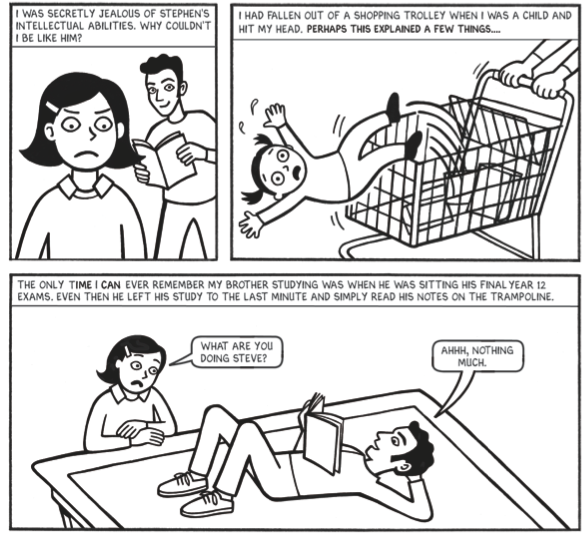
We’ve all heard stories of people leaving their revision until the night before an exam. We don’t tend to dwell too much on the stories where the student fails miserably.
The stories that stick in our minds are the ones of those people who manage to just scrape through the exam. Or students who score 90% on the exam when it looked like they didn’t do anything to prepare.
My brother Steve was one of these students. It looked like he didn’t study at all. Yet he went on to ace all of his exams. But the thing about Steve was he actually was studying. It just wasn’t so obvious.
For years I was under the illusion that my brother was a genius. I thought he was born smart and I wasn’t. Or perhaps I had hurt my brain when I fell out of a shopping trolley as a child (Note: my brain is actually fine). The excerpt below from my comic book ‘Smart Study’ illustrates my distorted thinking.
But my brother recently pointed out the craziness of this thinking. He told me that in high school he would study in little chunks of time for weeks (not days) before his exams.
In between playing a lot of computer games, Steve would go outside and lie on the trampoline to read and revise different concepts. Studying for exams was never actually a last minute thing for him. He took the time to understand the material and as a result, he knew the course content inside out.

I think it’s people like my brother that leave other students feeling perplexed and confused (“But he didn’t do anything. How on earth did he ace his exams?”).
It’s no wonder I meet students who think last minute cramming (or no cramming/study) is a good approach to take. I know this because I’ve seen it. And I’ve been one of those students too.
When I was in high school I was a master crammer. Cramming managed to get me though my subjects so I thought it was an effective approach. But it turns out I was wrong. Thanks a lot, science!
Neuroscientist Dr Wendy Suzuki says:
“The more you bring something to mind, the stronger that information becomes”.
Research shows that the more often we expose ourselves to information, the stronger the synaptic connections underlying the memory become. But if you’ve only looked at the information once or twice, it’s going to be weakly help up top.
You can think about learning information as being out in the jungle and coming across a track. The more you walk down the track, the greater chance you have that a solid track will form. But if you stop walking down the track, what will happen? The thick jungle vegetation will start to grow back and it will be much harder for you to find the path to walk down.
When you leave your revision until the night before an exam, the jungle is going to be thick and full of wild animals. The track is going to be non-existant so you need to hack a pathway through it. I hope you brought your chainsaw because this is going to be so much harder to do in a short period of time!
Whereas, if you start preparing for exams a few weeks beforehand, you’ll have a much clearer path to walk down on the day of your exam.
It may seem like a chore, but keep revising that information regularly. Not only will it save you time and energy later on, but you’ll have a much deeper understanding of the course content than someone who just pulled an all-nighter.
